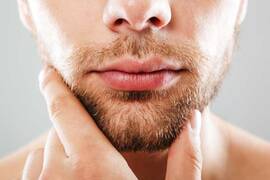What is hormonal alopecia? What causes it?
By Prof. Dr. Soner Tatlidede 2021-04-14

Hormonal alopecia is a type of hair loss that occurs due to changes in hormone levels, and is a major cause of hair loss, especially in women. In fact, female hair transplant demand is increasing in our clinic, and many ask us for a consultation due to alopecia problems caused by a hormonal alteration.
The reason is obvious: hormones are responsible for regulating many processes in our body, including hair cycles; hence, any variation directly affects our hair. But what are the specific causes of hormonal alopecia? Are there differences between men and women? Is hair loss caused bay hormonal imbalance reversible? These and other questions will be answered in this article.
What is alopecia due to hormonal imbalance?
As we have just said, hormonal alopecia refers to hair loss due to hormonal changes. Hormones play a key role in the correct functioning of our body: therefore, changes or imbalances in certain hormones levels are behind many physiological problems, and of course hair alterations. That is, any hormonal imbalance will affect our hair health, and may cause alopecia.
Some of these hormonal imbalances are caused by diseases, or due to aging or certain stages of life, such as pregnancy or menopause; in these cases, a consultation with a specialist can help us choose the most appropriate treatment to compensate these hormonal changes.
What hormone makes your hair fall out?
Although hormone changes may cause hair loss, there is an specific hormone that may cause directly hair loss, especially among men. Maybe you’re thinking of testosterone, which is produced 20 times more by men than by women; men also have 10 times higher blood levels of testosterone. However, contrary to the common belief is not testosterone what causes pattern hair loss, but the hormone dihydrotestosterone (DHT).
Science has proven that testosterone levels, or a higher concentration of this hormone, do not directly influence in hair loss; the problem is actually when testosterone, through the 5-alpha reductase type 2 enzyme, is transformed into DHT, which acts on follicles and causes them to atrophy: but only in those people with genetic sensitivity to this hormone. In women, DHT can also be one of the factors triggering hair loss, although it is not the main cause.
What matters and what must be emphasised is that it is the sensitivity of hair to DHT - determined by genetic inheritance, and not by the greater or lesser presence of testosterone or DHT - what will determine whether or not a person will suffer from alopecia, at least when we talk about pattern hair loss, which is the main cause of hair fall out in 9 out of 10 men.
Can hormonal changes cause hair loss?
The causes of hair fall or hair thinning in women are multiple and more varied than in men, and may be due to stress, vitamin deficiencies, hormone changes (e.g., alterations in oestrogen levels), etc. For example, women are the ones who most frequently suffer from telogen effluvium: a type of alopecia associated with hormone changes but also with situations of stress, trauma, etc.
A frequent form of hormonal alopecia among women is the one that occurs after childbirth; although during pregnancy the increase in oestrogen levels protects women against the action of hormones such as testosterone and DHT, after giving birth and during lactation, hormonal alterations occur and they also affect hair, being frequent in this period episodes of diffuse alopecia and even telogen effluvium.
It is estimated that approximately between one third to one half of women who have gone through childbirth, will suffer from telogen effluvium: this is what is called postpartum hair loss, which produces a sudden but reversible loss of hair. It is in fact the second most common cause of hair loss after pattern hair loss.
The use of contraceptive pills and also menopause are also associated with important changes in hormonal levels that can trigger significant hair loss, since there is an increase in male sex hormones (androgens).
Thyroid hormone imbalances, such as hypothyroidism or hyperthyroidism, can also cause hair loss. Alterations in thyroid gland functions cause hormonal changes that will weaken hair and cause it to fall out, as studies have shown. Hypothyroidism causes the capillary cycle to slow down, while hyperthyroidism accelerates it; but in both cases, hair loss increases.
Is hormonal hair loss reversible?
In most cases, hormonal imbalances or dysfunctions cause thinning hair or hair loss; however, this hair loss normally stops once hormonal balance is restored, and it’s reversible. The important point is that, whenever any hormonal change is detected, you should go for a consultation with a specialist to diagnose the problem and establish the most appropriate treatment.
However, if hormonal alopecia last too long, or if you face an alopecia caused by genetic factors (pattern hair loss), the loss of hair density will be definitive and it will be necessary to get a hair transplant. Clinicana is the best hair transplant clinic in Turkey, and we are specialists in all hair treatments. Request your free consultation now, or ask us for a free, no obligation estimate for your treatment. Get your hair back!








